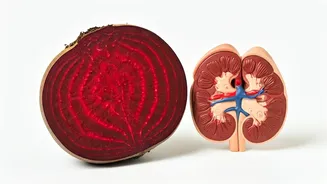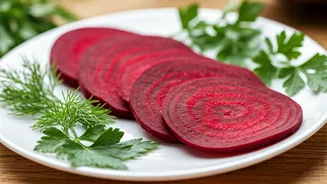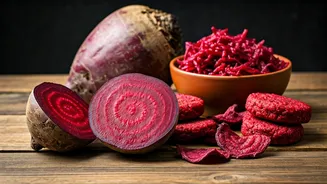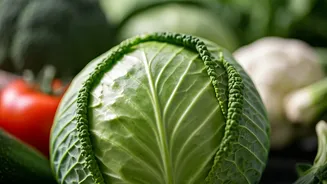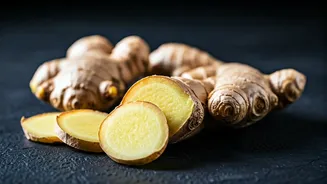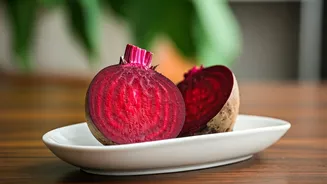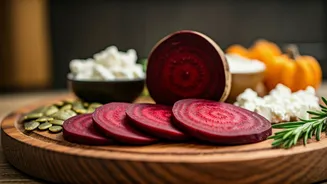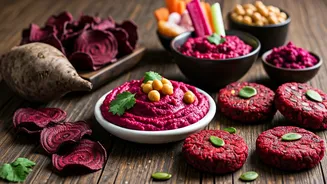Beetroot's Nutritional Profile
Beetroot, often called beetroot, has a rich nutritional profile, including essential vitamins, minerals, and antioxidants. These are packed with nutrients
such as folate (vitamin B9), manganese, potassium, iron, and vitamin C. These components contribute significantly to overall health. For instance, folate is vital for cell growth and development, while manganese acts as an antioxidant. The antioxidants in beetroot help combat free radicals, protecting cells from damage. It is also a good source of fiber, aiding in digestive health. The combination of these nutrients makes beetroot a valuable addition to any diet.
Heart Health Advantages
Beetroot’s high nitrate content can benefit cardiovascular health. Nitrates convert into nitric oxide in the body, which helps relax and widen blood vessels, lowering blood pressure. Studies have indicated that regular consumption of beetroot or its juice can reduce both systolic and diastolic blood pressure. Moreover, beetroot’s antioxidant properties help prevent the oxidation of LDL cholesterol, contributing to a lower risk of heart disease. The fiber content in beetroot also plays a role, helping to reduce cholesterol levels, further supporting heart health. Integrating beetroot into your diet can be a tasty strategy for promoting a healthy heart.
Enhanced Exercise Performance
Athletes often turn to beetroot for its performance-enhancing capabilities. The nitrates in beetroot boost nitric oxide production, which improves blood flow and oxygen delivery to muscles. This can lead to increased endurance and efficiency during exercise. Research shows that beetroot juice can improve stamina and reduce the perceived effort during physical activities. Whether you are a professional athlete or a fitness enthusiast, incorporating beetroot into your diet can potentially give you a competitive edge. It helps in providing the body with the support it needs to perform at its best.
Blood Sugar Regulation
Beetroot can play a role in managing blood sugar levels, making it beneficial for individuals with diabetes or those at risk. The fiber content in beetroot slows down the absorption of sugar in the bloodstream, preventing rapid spikes in blood glucose levels. Additionally, beetroot contains antioxidants, which can improve insulin sensitivity. The betalains present in beetroot might also contribute to better blood sugar control. While it should not replace conventional treatments, including beetroot in your diet, as part of a balanced meal plan, can be a supportive measure for diabetes management.
Digestive System Support
Beetroot is an excellent source of dietary fiber, crucial for maintaining a healthy digestive system. Fiber helps promote regular bowel movements and prevents constipation. It also nourishes beneficial gut bacteria, promoting a balanced gut microbiome. A healthy gut microbiome is essential for overall health, influencing everything from immunity to mental health. The fiber in beetroot can aid in the prevention of digestive disorders like diverticulitis and irritable bowel syndrome. By including beetroot in your diet, you can support your digestive health and improve your overall well-being. It helps to keep the digestive system running smoothly.
Liver Detoxification Benefits
The liver plays a vital role in detoxification, and beetroot can support this process. Beetroot contains betaine, which helps protect and promote liver health. Betaine assists in the breakdown of fats, preventing their buildup in the liver. It also has antioxidant properties that protect liver cells from damage. Regular consumption of beetroot can help improve liver function and reduce the risk of fatty liver disease. Including beetroot in your diet can be a step towards supporting your liver’s natural detoxification processes.
Anti-Inflammatory Properties
Beetroot's vibrant color is a clue to its potent anti-inflammatory properties. It contains betalains, which have antioxidant and anti-inflammatory effects. These compounds help to reduce inflammation throughout the body, providing potential relief from various inflammatory conditions. Chronic inflammation is linked to numerous health issues, including heart disease, arthritis, and cancer. By incorporating beetroot into your diet, you can support your body’s natural defense mechanisms against inflammation. It provides a natural way to mitigate the harmful effects of chronic inflammation.
Kidney-Friendly Consumption Guide
For individuals with kidney issues, eating beetroot requires careful consideration. Beetroot is high in oxalates, which can contribute to kidney stone formation in susceptible individuals. However, there are kidney-safe ways to enjoy beetroot. Moderate consumption is key. Combining beetroot with oxalate-rich foods can reduce oxalate absorption. It's beneficial to cook beetroot, as cooking can reduce the oxalate content. Consulting with a healthcare professional or a registered dietitian is crucial to determine the appropriate portion size and consumption frequency based on your kidney health. Understanding these precautions will allow you to enjoy beetroot safely.
Beetroot Recipes for You
There are numerous ways to enjoy beetroot. You can eat it raw, cooked, or juiced. Raw beetroot can be added to salads, providing a crunchy texture and vibrant color. Cooking beetroot mellows its flavor and increases its versatility. Roasting, boiling, or steaming beetroot are all great options. Beetroot juice is a popular choice and is easily incorporated into smoothies or enjoyed on its own. Experiment with beetroot in various dishes, such as soups, stews, or even desserts. Finding creative and delicious ways to integrate beetroot into your daily meals will allow you to reap its benefits without compromising on taste.
Selecting and Storing Beetroot
Choosing the best beetroot is key to maximizing its nutritional value and flavor. Look for firm, unblemished beets with their greens intact, as the greens are also edible and nutritious. Store beetroot in a cool, dark place. If you are not using the greens, you can remove them before storing the beets. Properly stored beetroot can last for several weeks. You can also roast or cook the beets and store them in the refrigerator for later use. Following these tips ensures that you have fresh and high-quality beetroot readily available whenever you want to prepare a healthy and delicious meal.
